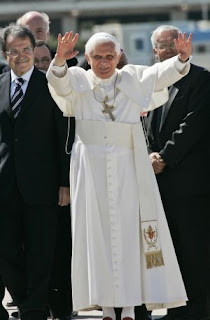It has become a political cliché this past year, given our serious fiscal woes, to insist that as a country we need comprehensive entitlement reform. I certainly number myself among those who agree with this assertion. Too often the discussion stops there, or progresses to some inane call for cancelling or dramatically curtailing all entitlements. I want to look at two programs that must be reformed if our country is to become fiscally sound: Social Security and Medicare. Regaining fiscal soundness will, of course, require more reforms than these, but Social Security and Medicare together make up the bulk of what needs to be reformed.
Dallas accountant, John Karrick, in a recent letter-to-the-editor of the New York Times, addressed both of these programs. He points out that Social Security is managed like a Ponzi scheme, the only difference being that it is considerably less sophisticated than a successful Ponzi scheme. He begins by pointing out the obviously regressive nature of both F.I.C.A. and Medicare payroll withholding. Indeed, everyone who is legally employed in the United States, no matter how little they make, pays 6.2% of their salary into Social Security. However, no F.I.C.A. is paid on salary over $106,800. He notes that all workers pay 1.45% into Medicare. Unlike Social Security, Medicare has no upper limit.
Simple arithmetic shows that U.S. workers pay 7.65%, up to $106,800, of their salary for Social Security and Medicare, which means the vast majority of workers in the U.S. pay this on their entire salaries. Nonetheless, despite the regressive nature of these mandated withholdings, there is a certain sense of fairness: you pay into Social Security and later receive Social Security (F.I.C.A. is not technically speaking a tax, but paying into an account) and the same is true of Medicare. Beyond that, your employer matches your 7.65% for a whopping total of 15.3% of what you make! Karrick is correct to point out that “[t]his amounts to a tax on employing people in the United States.”
I disagree with Karrick that we can find a better way to fund our Social Security and Medicare obligations. I am against privatizing Social Security, as are an overwhelming majority of people in the U.S., regardless of political affiliation. What is truly problematic, what we should all be much more worked up about, are these government-run Ponzi schemes. In the case of Social Security, Karrick is correct when he writes that “[t]oday’s contributions are used to pay beneficiaries who contributed yesterday, and the surplus of current contributions is ‘lent’ to the federal government and used for general spending.” It is this disastrous reality that has resulted in Social Security’s rapidly approaching insolvency. If everything that U.S. workers and employers had paid into Social Security remained in the trust fund from its establishment, Social Security would be solvent with a surplus (i.e., we could look at reducing contributions instead of ways to increase them- like upping the amount of salary one has to pay F.I.C.A. from the current $106,800). This is what Al Gore was talking about back in 2000 when he discussed his “lock box.”
Arising from my disagreement with Karrick over whether we can find better ways to fund these huge obligations is my opposition to his idea of formally melding Social Security and Medicare into general revenues, taking funds out of other taxes, most particularly the personal income tax. My reason for disagreeing is that rather than “reducing the tax burden of lower-income Americans,” as he asserts, I believe it will raise taxes on them. However, I readily concede that it would remove a disincentive to hire employees.
As Rich Rickman, writing over on Commentary’s Contentions blog (from whence I was pointed to Karrick's letter), points out, “[t]he Ponzi scheme underlying the Medicare system is even more blatant.” He points to the change made to your Medicare contribution in the truly horrible health care reform known as Obamacare: “[t]he legislation dispensed with the interim step of sending the money to the Medicare Trust Fund, to then be ‘lent’ to the general fund and spent on non-Medicare programs. Instead, the money from the new ‘contribution’ will go straight to the general fund; Medicare will not even get a government IOU to hold in ‘trust’.” Unlike Rickman, I am not bothered that the investment earnings of those making more than $200,000 per annum is now subject to the Medicare tax. It is a way of making the tax less regressive and, I believe, serves the common good by helping to shore up Medicare.
Not until we get worked enough to pay attention to details like these will we come anywhere close to making progress on these important matters that affect us all. In the meantime, we will continue to see-saw back-and-forth between the unabashed and ultimately disastrous statism of so-called progressives and the equally deleterious hyper-individualism of so-called conservatives. This is true of many issues, including immigration. In terms of Catholic social teaching it balancing solidarity with subsidiarity that fosters the common good.
Politics in the U.S. has become a net gain/net loss proposition. As it has been said of diplomacy, which is nothing except politics on an international scale- politics is the art of compromise. There are several ways to accomplish the end of reforming Social Security and Medicare, but reform them we must!
Maranatha






















